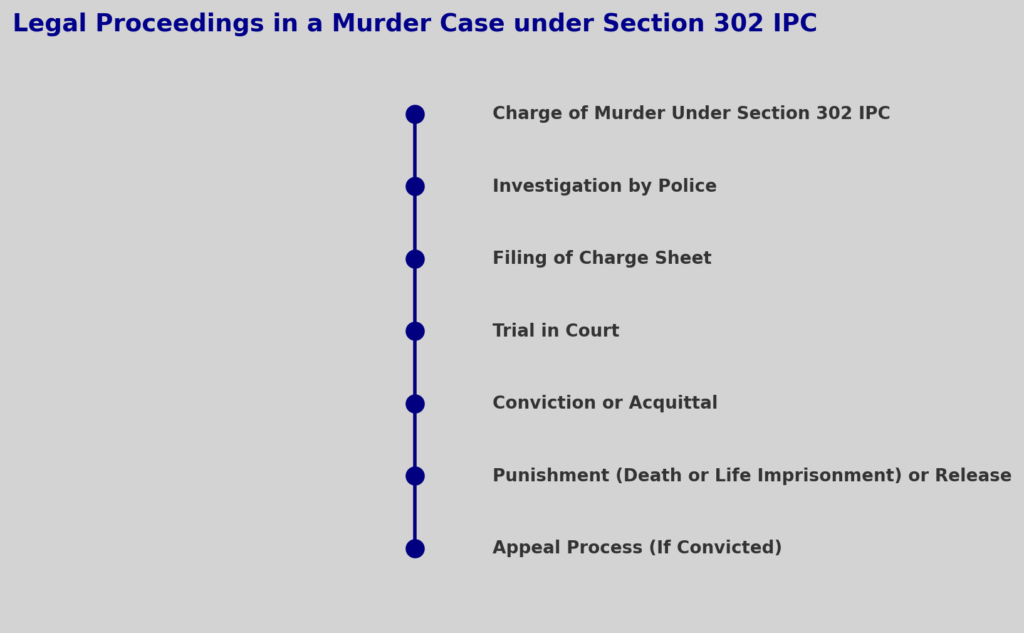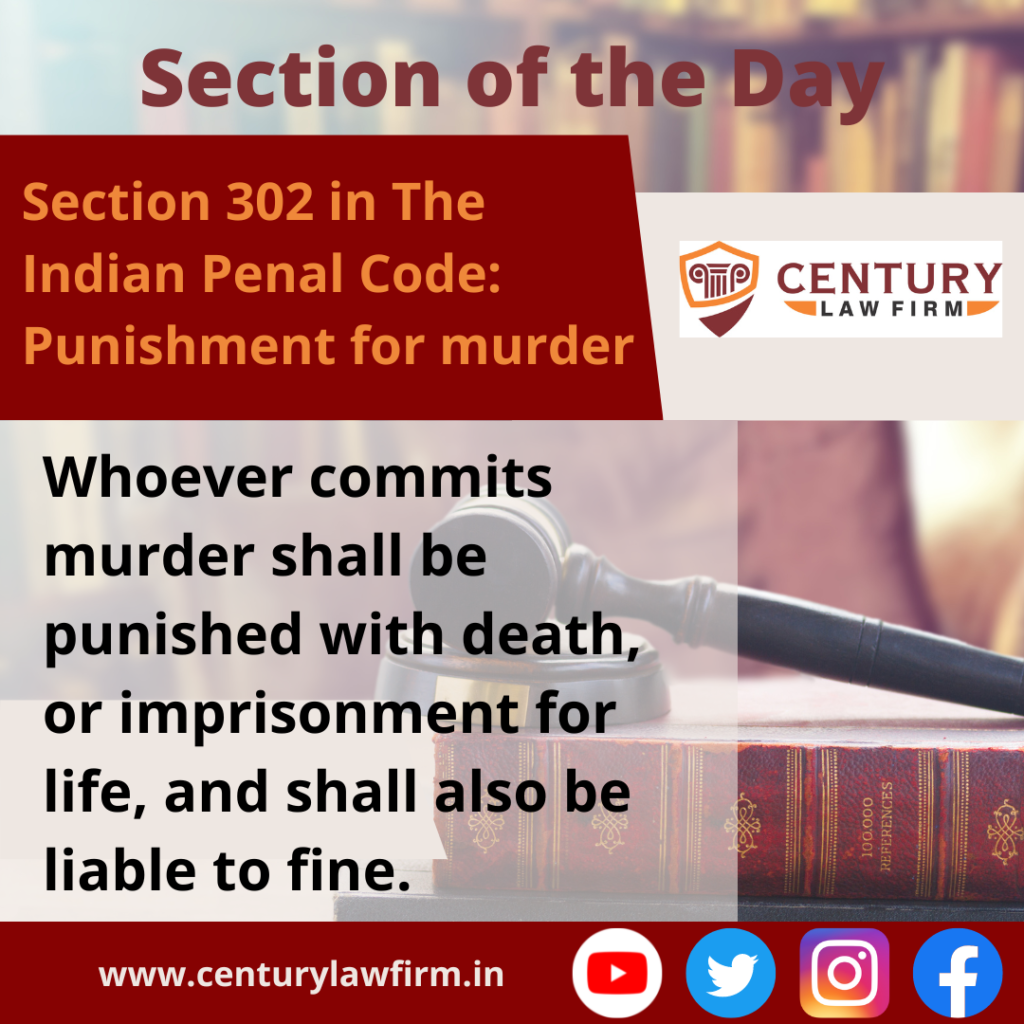Dive deep into the intricacies of Section 302 of the Indian Penal Code (IPC). Equip yourself with comprehensive knowledge of this crucial law concerning murder. Understand its implications, legal consequences, and the nuances that differentiate it from other sections of the IPC.
Section 302 in The Indian Penal Code (IPC): Punishment for murder
Whoever commits murder shall be punished with death, or imprisonment for life, and shall also be liable to fine.
Understanding Section 302 IPC
Section 302 of the Indian Penal Code (IPC) was enacted in 1860 by Lord Macaulay. The law has been amended several times since then.
Section 302 of the Indian Penal Code (IPC) defines the crime of murder and punishment for murder. The section states that whoever causes the death of any person with the intention of causing death, or with the intention of causing such bodily injury as is likely to cause death, or with knowledge that his act is likely to cause death, is said to commit murder.
In simple words, if a person intentionally causes the death of another person, he can be charged with murder under Section 302 of the IPC. It is important to note that the intention of causing death need not be premeditated, and can arise spontaneously in the heat of the moment.
Legal Consequences or Punishment of Section 302 IPC
The punishment for murder under Section 302 of the IPC is life imprisonment or death. The court has the discretion to decide the punishment based on the facts and circumstances of each case. In cases where the murder is committed with exceptional brutality or cruelty, the court may award the death penalty.
It is also important to understand the distinction between murder and culpable homicide not amounting to murder. Culpable homicide is a lesser offence than murder, and is defined under Section 304 of the IPC. The difference between the two lies in the intention of the accused. In cases of culpable homicide, the accused may not have had the intention of causing death, but has acted with reckless or negligent behavior that has led to the death of another person.
Additionally, Section 302 of the Indian Penal Code is a non-bailable and non-compoundable offence. This means that the accused cannot be released on bail easily and the case cannot be settled out of court between the parties involved. The accused must stand trial and face the full consequences of his actions.
This section is applicable to all persons, regardless of age or gender, and also to corporations and entities. It is a non-bailable and non-compoundable offense, meaning bail is not easily granted and the case cannot be settled out of court.
Getting bail in a case under Section 302 IPC
Getting bail in a case under Section 302 of the Indian Penal Code can be difficult as the section is considered to be a non-bailable offence. This means that the accused cannot be released on bail easily and must stand trial for the crime.
However, in some cases, the accused may be granted bail if there are exceptional circumstances or if the court finds that the accused is not likely to abscond or tamper with evidence. The grant of bail in such cases is at the discretion of the court, and the decision will depend on the facts and circumstances of each case.
In order to obtain bail in a case under Section 302 of the IPC, the accused must present a strong case to the court, showing that he is not likely to abscond or interfere with the proceedings. This may include providing sureties, surrendering passport, and undertaking to appear before the court as and when required.
It is also important to note that bail can be cancelled at any time if the court feels that the accused is not cooperating with the proceedings or is trying to evade justice.
In conclusion, getting bail in a case under Section 302 of the Indian Penal Code is a challenging task and requires a strong case to be presented to the court. It is important for the accused to seek the assistance of a competent legal professional to help navigate the bail process and increase the chances of success.
The section is applicable not only to individuals but also to corporations and entities. For example, if a company is found to have acted in a manner that has caused the death of another person, it can be held liable under Section 302 of the IPC.
It is also important to note that the section applies to all persons, regardless of their age or gender. This means that even minors and women can be charged with murder if they have caused the death of another person with the necessary intention or knowledge.
Probable Defences in a case of Section 302 Indian Penal Code (IPC)
In a case under Section 302 of the Indian Penal Code, the accused may have several defence options available to them. However, these defenses are subject to strict legal scrutiny and must be proven in court. Some of the commonly used defences are:
Lack of intention to cause death: The accused may argue that he did not have the intention of causing death, and that the death was a result of an accident or mistake. In such cases, the accused may be charged with a lesser offence such as culpable homicide not amounting to murder under Section 304 of the IPC.
Self-defence: The accused may argue that he was acting in self-defence, and that he had to cause the death of the victim in order to protect himself or others from harm. In such cases, the accused must prove that the act of causing death was necessary and reasonable in the circumstances.
Provocation: The accused may argue that he was provoked into committing the act of murder, and that his actions were a result of that provocation. However, the defence of provocation is a narrow one and can only be raised in limited circumstances, such as when the victim had insulted the accused or his family, or when the accused was subjected to physical violence. In some cases, the defence of “provocation” may be raised. This means that the accused may argue that he was provoked into committing the act of murder, and that his actions were a result of that provocation. However, the defence of provocation is a narrow one and can only be raised in limited circumstances.
Alibi: The accused may argue that he was not present at the scene of the crime, and that he is innocent. In such cases, the accused must provide evidence to support his alibi, such as witness testimony or other forms of evidence.
Mental illness: The accused may argue that he was suffering from a mental illness at the time of the crime, and that he was not capable of forming the necessary intention or knowledge required for murder. In such cases, the accused must provide medical evidence to support his claim.
It is important to note that the success of these defences will depend on the facts and circumstances of each case, and the accused must provide sufficient evidence to support his defence. It is also important for the accused to seek the assistance of a competent legal professional to help navigate the defence options available to him.
In recent years, the Indian judiciary has taken a strong stance against crimes such as murder, and has imposed strict punishments in cases where the accused is found guilty. This is aimed at deterring others from committing such crimes and ensuring that justice is served.
In conclusion, Section 302 of the Indian Penal Code is a serious offence that must be taken seriously. It is important for individuals to understand the seriousness of the crime and the consequences of their actions, and to act in a responsible manner to avoid causing harm to others. Section 302 of the Indian Penal Code is a serious offence that attracts severe punishment. It is important for individuals to understand the distinction between murder and culpable homicide, and to act in a responsible manner to avoid causing harm to others.
Who Can Be Charged Under Section 302 IPC for Murder?
Anyone who commits an act of murder can be charged under section 302 of the Indian Penal code. This includes people who commit suicide, as well as those who kill others without any intention to do so. The section applies to all persons, regardless of their age or gender, and even corporations and entities can be held liable under Section 302 of the IPC.
What Is The Punishment For Murder under Section 302 IPC?
If you are found guilty of committing murder, you will face imprisonment for life or death. In addition, there are other punishments that can be imposed on you, such as fines, community service, and even deportation.

When Does A Person Become Guilty Of Murder?
Under section 302 of the Indian Penal code, a person becomes guilty of murder when he/she commits an act causing death by either (a) poisoning; (b) giving poison voluntarily knowing it to be likely to cause death; (c) administering any noxious thing with intent to commit suicide; (d) wilfully doing an act which endangers human life; or (e) wilfully causing or procuring the miscarriage of a woman.
What Are The Elements Required To Prove Murder?
In order to prove murder under section 302 of the Indian penal code, the prosecution must establish beyond reasonable doubt that the accused committed an unlawful killing and that the accused had the requisite mens rea.
What Happens After A Person Commits Murder?
If the accused is found guilty of murder, he/she will be sentenced by the court. Depending on the circumstances of the case, the sentence might range from imprisonment for life to death.
Conclusion
Section 302 of the Indian Penal Code is a serious offence that must be taken seriously. It is important for individuals to understand the distinction between murder and culpable homicide, and to act in a responsible manner to avoid causing harm to others.
If you are looking for the best criminal case lawyers then contact Century Law Firm today.


